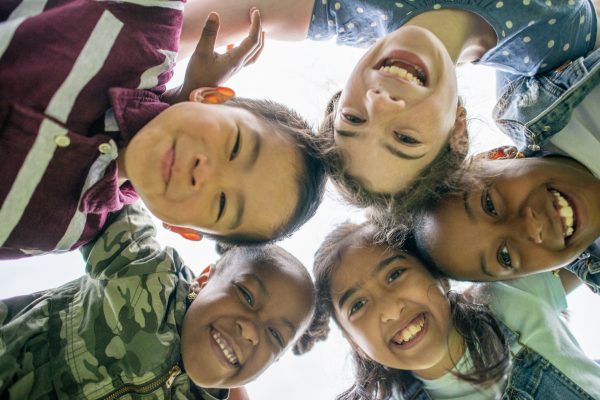Do you remember the little rhyme that says “sticks and stones will break my bones, but names will never hurt me?” Yeah, it’s so very wrong, isn’t it? But I remember saying it as a child to my sister, usually followed up with my eyes pinched shut and my tongue stuck out. I could act like the name-calling didn’t hurt me, but it really did. Let’s face it—name-calling and mean words sting. And the hurt doesn’t go away quickly. It can last for days, even years, especially if the other person does little to make up for it.
We don’t want our kids to say mean things to each other. We don’t want them to fight. But it happens. Like my sister, I called names and said hurtful things growing up too. No child is perfect. But saying “sorry” doesn’t always work and often isn’t enough. Here are 3 ways to teach kids how to make up with a friend or sibling after a fight.
1. Make three kind statements for every hurtful one.
Insults hurt. Names hurt. A wise friend once told me that she has her kids say three kind statements after one of them hurts the other. “It takes at least three to make up for that one insult,” she said. So I gave it a try on the way to school last week when my son was criticizing my daughter for always being late. He sighed but did as he was told. “You draw really well. You take care of the puppy really well.” He paused, thinking. “And I like playing LEGOs with you.” By the time we got to school, she’d forgiven him, and they walked into the building together.
If your child doesn’t know what kind of statements you’re looking for, model it. When we first started this technique, I showed my kids what I meant by going first: “She’s so thoughtful. She gives great hugs. And she knows how to make me laugh.” Not only does this provide great examples for both kids, but it builds up one of them in the process and is particularly helpful after that child has been hurt.
2. Make three attempts at peace.
Hurt feelings don’t disappear right away. If my daughter wants to make up with a friend, I advise her to make three separate attempts at peace. This might include 1) a spoken word, a text, or a note to offer an apology, 2) a stop at the friend’s locker the next morning to apologize, and 3) a (seemingly) spontaneous approach on the playground, after school, or at lunch to offer a kind word.
It would be a good idea to space out these attempts and not do them all in one day. Advise your child to be patient. Friends might not be ready to accept an apology right away and could need time to process what happened and how they feel.
3. Take three minutes to listen to the other person.
A child who wants to make up with a friend needs to be willing to listen if the friend who’s hurt wants to vent. This will be hard! If my son hurts my daughter but she’s not quite ready to forgive him, he should listen to her. “You hurt my feelings,” she told him recently. “I don’t like it when you call me ‘Small Fry.’” Instead of acting defensive or telling her she deserved it, he’s been taught to just listen. It has taken practice and several gentle reminders, but I’m starting to see him bite his lip and nod more than not. If he does, the discussion is usually over in seconds and they’re friends again.
Have you heard that “it’s better to be kind than right?” I often remind my kids of this wisdom. It pairs well with the advice to keep mouths shut and listen. Fights end quicker and apologies mean more if kids think about the other person’s feelings more than their own need to be right.
Fights end quicker and apologies mean more if kids think about the other person's feelings more than their own need to be right. Click To TweetWhat is your advice about how to make up with a friend?










